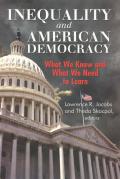Main navigation
 Do the poor have as much say as the rich in the American political system? In the wake of the 2012 Presidential race – the most expensive in history – as well as the landmark 2010 Citizens United case, the political influence of the wealthy has become a much-discussed topic. However, our understanding of how rising inequality has influenced the U.S. political process and the policies it has produced remains limited. While both scholars and citizens suspect economic elites have great influence on politics, social scientists have yet to quantify that influence and identify the causal mechanisms linking elite influence and money to political outcomes.
Do the poor have as much say as the rich in the American political system? In the wake of the 2012 Presidential race – the most expensive in history – as well as the landmark 2010 Citizens United case, the political influence of the wealthy has become a much-discussed topic. However, our understanding of how rising inequality has influenced the U.S. political process and the policies it has produced remains limited. While both scholars and citizens suspect economic elites have great influence on politics, social scientists have yet to quantify that influence and identify the causal mechanisms linking elite influence and money to political outcomes.
Emerging empirical evidence has shown some promising pathways for future research. In Affluence and Influence, RSF grantee Martin Gilens of Princeton University shows that America's policymakers respond almost exclusively to the preferences of the economically advantaged. Moreover, a recent paper by political scientist Nicholas Carnes of Duke University demonstrates that the near-absence of the working-class people in public office promotes economic policies that benefit white-collar Americans at the expense of the less fortunate.
To deepen our understanding of the relationship between economic and political inequality, the Russell Sage Foundation launched its Politics of Inequality initiative in 2006. As part of this effort, the Foundation recently created a new working group to expand the research field of economic influence on political life by examining how economic elites have influenced the myriad ways politics is done and the relationship between these processes and inequality. The research questions to be explored through this working group, led by sociologist Shamus Khan and political scientist Dorian Warren of Columbia University, are twofold. First, how do elites use their economic resources to influence political outcomes? And second, how has the increase in inequality over the past forty years—particularly the increase in the wealth/income share of elites—impacted processes of political influence? And how have the outcomes of political influence affected the overall levels of inequality?
Over the next couple of years, the working group will seek to: 1) posit new major theoretical frameworks to help make sense of mechanisms of elite power and influence; 2) contribute a range of empirical methodologies for measuring elite influence in politics; 3) collect and make available new sources of data; and 4) focus on political outcomes that matter for inequality and democratic governance. We will share the findings of this working group on RSF Review, and elsewhere on the Russell Sage website.





